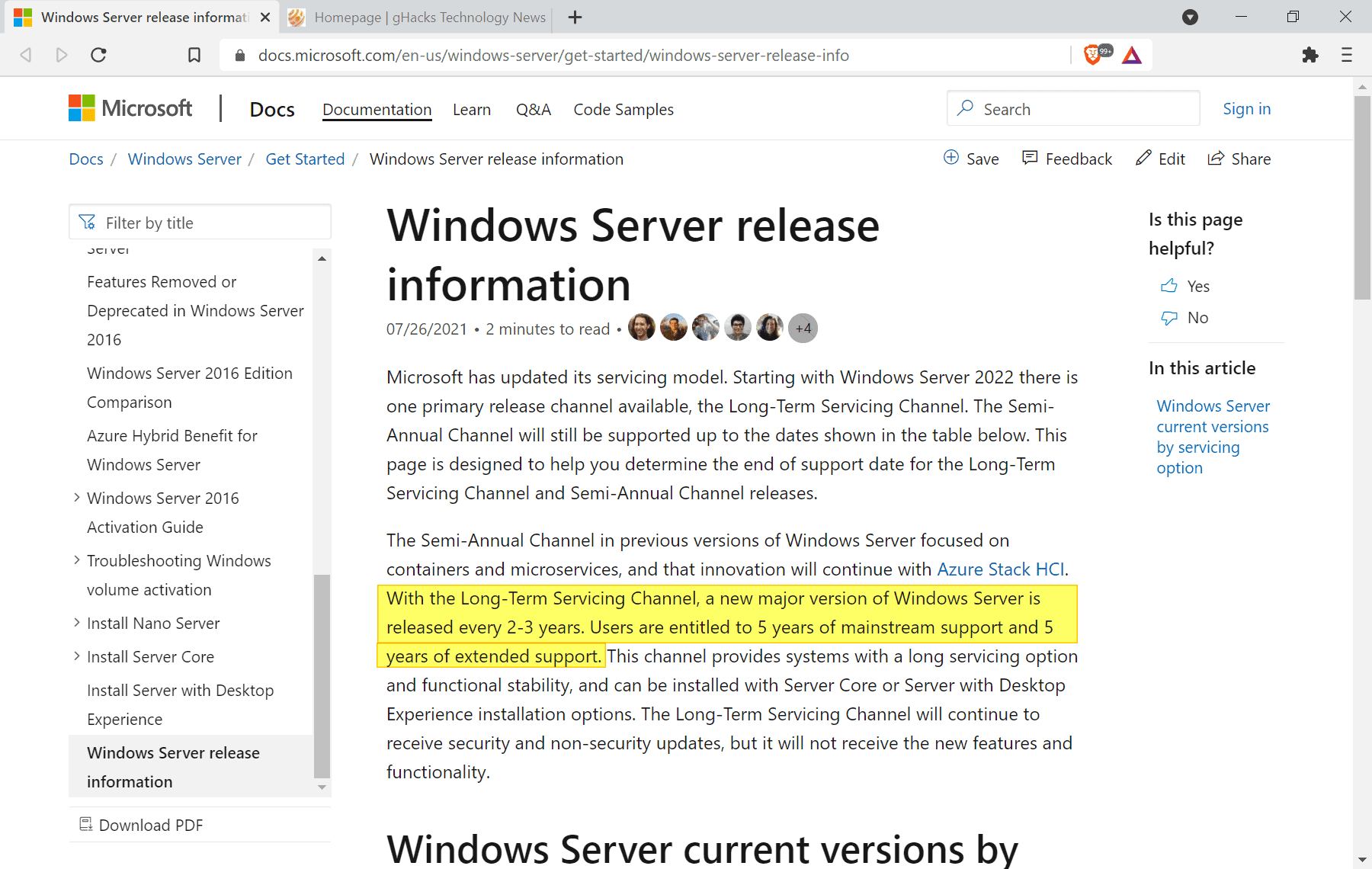All future Windows Server releases receive 10 years of support

All future Windows Server releases will be Long-Term Servicing Channel (LTSC) releases with ten years of support according to Microsoft. Windows Server 2022 will be the first release that will only be offered as a LTSC release.
Long-Term Servicing Channel releases of Windows Server receive 5 years of mainstream support and 5 years of extended support. Mainstream support provides security and non-security updates to the Windows Server release, extended support focuses on delivering security updates for the product.
Microsoft plans to release new Windows Server versions every 2-3 years, and each will receive 10 years of support as it will be a Long Term Servicing Channel release.

Windows Server releases under the new Long-Term Servicing Channel won't receive new features and functionality according to Microsoft, only security and non-security updates (the latter means bug fixes for the most part).
This channel provides systems with a long servicing option and functional stability, and can be installed with Server Core or Server with Desktop Experience installation options. The Long-Term Servicing Channel will continue to receive security and non-security updates, but it will not receive the new features and functionality.
Semi-Annual Channel releases of Windows Server focused on "containers and microservices", and these will "continue with Azure Stack HCI".
Microsoft published the following table with updated mainstream and extended support end dates.
| Windows Server release | Version | Build number | Availability | Mainstream support end date | Extended support end date |
|---|---|---|---|---|---|
| Windows Server, version 20H2 (Semi-Annual Channel) (Datacenter Core, Standard Core) | 20H2 | 19042.508.200927-1902 | 10/20/2020 | 05/10/2022 | Not applicable |
| Windows Server, version 2004 (Semi-Annual Channel) (Datacenter Core, Standard Core) | 2004 | 19041.264.200508-2205 | 05/27/2020 | 12/14/2021 | Not applicable |
| Windows Server, version 1909 (Semi-Annual Channel) (Datacenter Core, Standard Core) | 1909 | 18363.418.191007-0143 | 11/12/2019 | 05/11/2021 | Not applicable |
| Windows Server 2019 (Long-Term Servicing Channel) (Datacenter, Essentials, Standard) | 1809 | 17763.107.1010129-1455 | 11/13/2018 | 01/09/2024 | 01/09/2029 |
| Windows Server 2016 (Long-Term Servicing Channel) (Datacenter, Essentials, Standard) | 1607 | 14393.0 | 10/15/2016 | 01/11/2022 | 01/11/2027 |
Windows Server 1909, 2004 and 20H2 won't receive extended support. All three releases are Semi-Annual releases of Windows Server.
The previously released Windows Server 2016 and 2019 releases are Long-Term Servicing Channel releases. These are supported until 2027 and 2029 respectively.
Windows Server 2022 will be supported for ten years and is expected to be released before the end of 2021. The new Server version is currently in public preview on the Evaluation Center.
Microsoft highlighted the following features on its Cloud Blog in March 2021:
- Advanced multi-layer security
- Hybrid capabilities with Azure
- Flexible application platform
Now You: What is your take on this (via Deskmodder)


















Windows 11 will be so bad, that Windows Server will be a lot of users future desktop OS.
Seems like most anyone can buy the Server 2019 Essentials version. No CAL’s required, up to 16 physical cores, one server, 50 users, I think. About twice the price of Pro from real resellers or four times the price of Pro from MS.
Or go ebay or wherever and roll the dice. If the license works, MS verifies it’s real, yay.
Extended, way long support for Server software that’s really old seems to indicate all the inane changes made to non-server Windows in the name of security and functionality are probably mostly BS.
Also says MS predicts nothing fundamental changing in the next decade. Doesn’t take a wizard to see that.
I mean, XP is definitely obsolete, I ran ours into the ground years ago but Win 10 from two years ago has to be equivalent to today’s. With less junk.
I know someone that will be happy with that pirated copy of Windows LTSC.